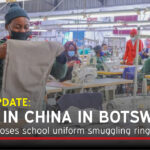MEET THE BOSS
Growing up, Godfrey Bonno Molefe never imagined that one day he would stand at the helm of one of the country’s biggest organisation’s, charged with a huge workload and a ton of responsibilities.
In fact, back then, all he ever wanted was to become a journalist!
In the end though, media missed out, with the 54-year-old going on to forge an incredible career in the corporate world.
Boasting bags of experience, Molefe’s CV includes stints at University of Botswana (UB), Botswana Power Corporation (BPC), Botswana Institute of Accountants, Botswana International University of Science &Technology (BIUST) and Botswana Bureau of Standards (BoBS) to mention just a few!
In 2019, Molefe’s professional path brought him to Local Enterprise Authority (LEA), where he initially joined as Chief Finance Officer before assuming the role of Acting Chief Executive Officer earlier this year.
With a Masters of Science in Fiscal Policy from University of Bath to his name, let’s meet the Mochudi native making his mark at LEA…
The last five years of your illustrious career have been spent at LEA; how’s it going?
Since joining the authority in 2019, it has been undergoing a consolidation and alignment since restructuring.
The organisation went through a restructuring exercise in 2019 which left a lot of remnants right from the organisational structure, pay structure, alignment issues which we have been working on amid the proposed merger [with CEDA], which has meant we have to do things in a cautious manner.
Despite these issues, we continue to contribute to the national GDP through SMME development, which as at the end of 2019 stood at 14.3 percent (P35 billion).
We would like to increase this to 17 percent (P48.1 billion) by 2026, given that the economy continues to grow at an average rate of 4-5 percent and SMMEs continue to take advantage of statutory instruments such as import restrictions, citizen inclusion polices and other procurement advancement by government.
We are also working very hard to align with the development of the leather value chains, The RESET agenda 9 – Digitization, where we are putting a lot of our service-offerings online through our website and contact center for now.
LEA’s mission is to ‘promote and facilitate Entrepreneurship and SMME development through targeted interventions in pursuit of economic growth and job creation’. Kindly break it down for us?
We promote entrepreneurship and ultimately impact SMME development by offering business interventions that address identified business needs or gaps for an enterprise after its diagnosis. Closing identified gaps helps enterprises to be viable and grow either by value of turnover or jobs created. Growth in turnover of SMME enterprises impacts growth of the economy.
What can you point to as some of the authority’s biggest achievements?
LEA started operations in 2006 and I can confidently say that since its inception, the Entrepreneurship landscape has changed with more Batswana occupying businesses in industries that we would not have dared to try before. Our capacity development interventions, that include training, industry workshops and incubation program, has given Batswana enterprises the boost that they needed to compete either with locally established entities or imported products and services.
There are infinite testimonies to share but I will sum it up by giving live examples to industries that SMMEs have since penetrated because of LEA’s assistance, and of course other players in the SMME ecosystem, to maximize government enabling interventions that are in place. In the Manufacturing space, there are popular local brands that are on retail space, some that had started their business at home but managed to grow their brands as result of the LEA incubation program.
We see more and more products manufactured in the Food & Beverages as well as Body & Hair Care products making it to retail. Some of these clients would have benefited from LEA business interventions such as: product certification or licensing, product packaging and branding, etc.
What about Agro businesses, how have you helped them?
Through our horticulture incubation program, we have seen horticulture grow in the country. This growth was catapulted by various government schemes – funding and inputs subsidy – and of recent, the introduction of the import ban on several horticulture products. We continue to train more youth owned enterprise to fully occupy this sub sector.
We have developed start-ups across various sectors, but I would like to highlight that the reason we have never struggled to find a loaf of bread in shops following the import ban was due to capacity building provided by LEA through Baking 7 Confectionaries training. We see new entrants in the Digital & Innovation space as well as the Medical & Consumables products. In 2004 when LEA was founded, some of these enterprises were far-fetched dreams. But they are now a reality.
So do you feel LEA has successfully delivered on its mandate over the years?
Based on the highlights I outlined, I would say yes and no. Yes, because of the just mentioned successes, which speak to capacitation and growth of small to medium enterprises.
And no, because over the years we have not done so well in capacitating and growing the informal sector. Our efforts may not be sufficient; it is a constituency that I can attest to say we have neglected over the years. But we have started work to rectify that by initiating projects that will benefit them as a collective. We have started projects targeting the informal sector. Just to state one example, we are currently developing a small stock incubator in Ghanzi – beneficiaries of this projects will mainly be from the informal sector.
As CEO, what kind of legacy do you want to leave at LEA?
Obviously I would have promoted LEA as the leader in entrepreneurship development.
What is the organisation doing in regards to driving diversification and improving exports?
We continue to build and grow enterprises in sectors and industries that the government has earmarked for growth and diversification. To equip enterprises to fulfill the local demand and ultimately export following the restriction on import of uniforms, we are developing a textiles incubator and a small stock incubator to help in increasing production of small stock to ultimately satisfy the export market that the government has identified for local producers.
What challenges does LEA face in achieving its mandate?
LEA’s mandate is to equip an entrepreneur and develop the enterprise. We do this for startups and existing businesses. Limited funds is a challenge for all of us and so I will not dwell on it. Our challenges at LEA are tied to those of the SMMEs that we mentor just as much as their success is linked to ours. Access to funding and markets remains the two biggest challenges.
On average how many clients does LEA help in a year?
An average of 1, 500 clients per year.
LEA exhibited at the Consumer Fair and Global Expo recently – what did you get out of it?
Participation at exhibitions by LEA clients is one of the market linkages program that we offer our SMMES. What SMMEs derive from these fairs are: product awareness, sales and sales leads. These shows offer our SMMEs a platform to launch new product lines, test the market and collect feedback from their customers. They get to network among themselves and other enterprises at those fairs, building networks and supplier database. Some of our SMMEs have been able to secure some of their big contracts through exhibition at these fairs.
With LEA now based at the Ministry of Entrepreneurship, how has that improved service delivery?
The Ministry of Entrepreneurship has been in operation for less than 12 months and so it’s too early to point out the benefits. But I can outright say that with the new ministry, emphasis and focus on developing entrepreneurship have been consolidated and are now housed under one ministry making it easier to track and evaluate each initiative’s impact. There have been synergies identified and maximized by the state owned enterprise under the ministry. For us at LEA it makes it easy to advocate for SMME issues within the ecosystem.
Any milestones to report in terms of job creation and support of home grown brands?
When you look at our four year performance, it shows that a record aggregate of jobs sustained and created stood at 1, 023 in 2019; 1, 882 in 2020; 1, 438 in 2021 and 9, 892 in 2023. The value of import substitution has grown from P21.3 million in 2020 to P488 million in March 2023. We intend to grow value of Secured Local Market from P419 million to P1 billion in March 2024.
Going forward, where would you like to see LEA improve?
We intend to grow the value of SMME turnover from P1.4 billion to P2.4 billion by March 2024. For this financial year, we target to sustain 90 percent of the 9, 892 jobs recorded the previous year and create an additional 2, 200 jobs.
Yours must be an extremely stressful job – how do you handle the pressure?
I would not say it’s a stressful job. The role comes with added responsibilities and healthy pressure because I must drive the organisation to deliver its mandate and achieve its set target. And that pressure is eased by the support that we receive from the Minister of Entrepreneurship, Hon Karabo Gare and PS, Mr. Kabelo Antony Ebineng and their team. I should note that the Ministry has laid an enabling environment in that they have opened doors of engagement right from inception. Our Board of Directors have also played an immense role in providing oversight guidance which enables us to deliver.
Away from the office, how do you relax?
Loitering around the kitchen and running errands while Onti cooks.


















